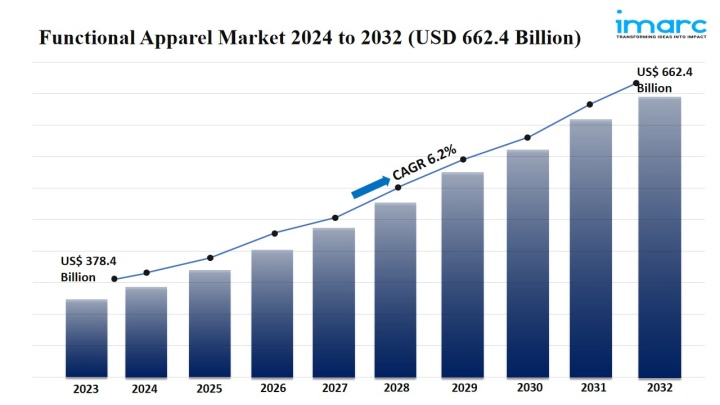

IMARC Group’s report titled “Functional Apparel Market Report by Product Type (Sports Wear, Active Wear, Protective Clothing, and Others), Application (Sports Industry, Outdoor Clothing, Healthcare), Distribution Channel (Supermarkets and Hypermarkets, Convenience Stores, Online Stores, and Others), and Region 2024-2032″. The global functional apparel market size reached US$ 378.4 Billion in 2023. Looking forward, IMARC Group expects the market to reach US$ 662.4 Billion by 2032, exhibiting a growth rate (CAGR) of 6.2% during 2024-2032.

For an in-depth analysis, you can refer sample copy of the report: https://www.imarcgroup.com/functional-apparel-market/requestsample
Factors Affecting the Growth of the Functional Apparel Industry:
The continuous technological advancements and innovations in materials are impelling the growth of the market. These advancements are leading to the development of fabrics that offer enhanced functionality, such as improved breathability, moisture-wicking properties, temperature regulation, and durability. Innovations, such as smart textiles, which can monitor health metrics or change color based on environmental conditions, are pushing the boundaries of what apparel can do. Moreover, the integration of nanotechnology and the development of sustainable materials that offer environmental benefits without compromising performance are key factors contributing to market growth.
The rise in health consciousness and fitness awareness among people plays a crucial role in driving the demand for functional apparel. As individuals increasingly engage in various physical activities, including gym workouts, yoga, and outdoor sports, the demand for sportswear and activewear that supports and enhances performance, comfort, and safety is increasing. This trend is supported by the growing popularity of fitness apps and wearable fitness trackers, encouraging people to become more invested in their health and physical activities. Functional apparel which are designed to cater to specific needs, such as compression, sweat-wicking, and thermal insulation, is becoming essential for people looking to optimize their workout efficiency and comfort.
The blurring lines between fashion and functionality in apparel is supporting the market growth. The shift towards athleisure clothing that blends the aesthetics of athletic wear with the comfort and style suitable for everyday wear is gaining immense popularity among a broad demographic. This fusion is leading to an increased demand for functional apparel that is not only performance-oriented but also fashion-forward. Designers and brands are responding by creating products that incorporate the latest fashion trends with functional features, making them appropriate for both fitness activities and casual settings.
Leading Companies Operating in the Global Functional Apparel Industry:

Functional Apparel Market Report Segmentation:
By Product Type:
Sportswear represent the largest segment due to the rising number of individuals indulging into sport activities to lead an active lifestyle.
By Application:

Sports industry accounts for the majority of the market share owing to the rising demand for effective and functional apparel items.
By Distribution Channel:
Supermarkets and hypermarkets represent the leading segment. They offer a wide range of functional apparel products.
Regional Insights:
North America’s dominance in the functional apparel market is attributed to rising adoption of healthy lifestyle habits among the masses.
Global Functional Apparel Market Trends:
The rising demand for sustainability and ethical manufacturing practices is bolstering the market growth. As awareness about environmental issues and social responsibility is rising, people are seeking products that align with their values. This shift in behavior is prompting brands and manufacturers to adopt eco-friendly materials, such as recycled polyester, organic cotton, and biodegradable fabrics, in their functional apparel lines. Additionally, the growing emphasis on reducing carbon footprints, water usage, and chemical dyes in the production process is contributing to the market growth. Ethical manufacturing practices, including fair labor conditions and transparent supply chains, are also becoming critical criteria for choices. This shift towards sustainability and ethics not only appeals to environmentally conscious individuals but also helps brands differentiate themselves in a competitive market.
Note: If you need specific information that is not currently within the scope of the report, we will provide it to you as a part of the customization.
About Us:
IMARC Group is a leading market research company that offers management strategy and market research worldwide. We partner with clients in all sectors and regions to identify their highest-value opportunities, address their most critical challenges, and transform their businesses.
IMARCs information products include major market, scientific, economic and technological developments for business leaders in pharmaceutical, industrial, and high technology organizations. Market forecasts and industry analysis for biotechnology, advanced materials, pharmaceuticals, food and beverage, travel and tourism, nanotechnology and novel processing methods are at the top of the companys expertise.
Our offerings include comprehensive market intelligence in the form of research reports, production cost reports, feasibility studies, and consulting services. Our team, which includes experienced researchers and analysts from various industries, is dedicated to providing high-quality data and insights to our clientele, ranging from small and medium businesses to Fortune 1000 corporations.
Contact Us:
IMARC Group
134 N 4th St. Brooklyn, NY 11249, USA
Email: sales@imarcgroup.com
Tel No:(D) +91 120 433 0800
United States: +1-631-791-1145
